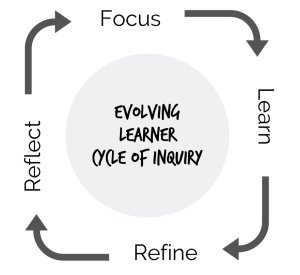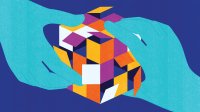3 Keys to Evolving as a Lifelong Learner
Engaging in a process of learning, unlearning, and relearning puts educators on a path to continuous improvement.
Your content has been saved!
Go to My Saved Content.If there is one phrase that is most universal in teacher-prep programs, it’s probably “lifelong learner.” And it’s true—when we head off to our first teaching assignment, we are not finished learning by a long shot. In fact, the journey is just beginning. But what we don’t often hear is that part of being a lifelong learner is evolving not only in what we learn but in how we learn.
Futurist Alvin Toffler famously wrote, “The illiterate of the 21st century will not be those who cannot read and write, but those who cannot learn, unlearn, and relearn.” As educators we should be continually evolving in the practice of learning.
3 Strategies for Evolving as Learners
1. Reframe our mindset. Education reformer Dylan Wiliam says, “If we create a culture where every teacher believes they need to improve, not because they are not good enough but because they can be even better, there is no limit to what we can achieve.”
One strategy to unlearning is to embrace the mindset of continuous improvement. In our ever-changing world, the way we learn needs to continuously adapt to leverage new possibilities, not because we aren’t good enough but because we have even more opportunities to be better.
To be clear, we, as educators, aren’t the only ones who need to be unlearning and relearning. In fact, one of the biggest challenges we can face in the shift from more teacher-driven practices to learner-driven practices (e.g., project-based learning) is the pushback from kids who are used to learning a certain way, especially if they have mastered how to do what is needed to get that “A.” Both kids and adults can iterate, continuously improving and evolving as learners.
2. Be less helpful. I can imagine the visceral reaction some may have to the title of this section. It is often part of our identity as educators to be helpful, provide answers, and solve problems. However, when we burden ourselves with that hero mentality, we can miss out on the opportunity to learn from others, and we aren’t building capacity in others. We don’t want to rescue, we want to strategically insert ourselves.
We also have to be brave enough to say, “I don’t know, and I’d love to learn that with you.” With both kids and our peers, we need to (cue Aaron Burr in Hamilton) “Talk less.” And we need to learn to listen better, but not just listen—actively listen to learn.
3. Ask more questions. I will date myself here, but I’m old enough to remember a time when if you needed information, you had two choices: find someone who knew a lot or head to the encyclopedia.
Now we have a portal to information in our pocket, but with that comes new challenges such as finding and validating information to avoid confirmation bias and get out of our filter bubble. We need to evolve the way we learn because the world has evolved, and we have new and different opportunities to learn now.
When we move outside our building and our role/content area to gain a new perspective, there are even more options. We can use social media, read, and listen to podcasts. Here are some great examples. This shift to asset-based thinking is critical to embrace the robust options as we move forward.
Disclaimer: Unlearning Can Be Hard!
Many of us spent our formative years with a teacher exclusively lecturing at the front of the room while we remained quietly and passively seated in rows to absorb information, but in the immortal words of Maya Angelou, “When you know better, you do better.”
It’s not easy to rewire your brain, though. Have you ever seen that viral video The Backwards Brain Bicycle? This is an entertaining look at how neural pathways enter into the process of unlearning. Before that, though, how do we even know what we should unlearn?
In the book Evolving Learner, my coauthors and I share how learning from kids, peers, and the world (our learning network) gives us the social and emotional support to be strong enough to be vulnerable. A cycle of inquiry, such as focus, learn, refine, reflect, provides a structure to challenge our beliefs through action research. The two combined give us the capacity to learn, unlearn, and relearn as needed. As adaptive experts, we can do the following:
- Focus on a problem of practice that, if improved upon, significantly and positively impacts learners,
- Learn or unlearn and relearn in order to discover our best option(s),
- Refine as we implement that practice, and
- Reflect on the impact continuously to keep us moving toward success.

This is an ongoing, iterative process. We will almost certainly fail along the way, but that is a natural part of this messy, nonlinear, and sometimes scary process.
Last year, organizational psychologist Adam Grant tweeted, “What we need in leaders is not confidence, but confident humility.” Whatever our role is in education, we are all leaders, and as someone who battles with impostor syndrome, I try to leverage that humility, but I also need confidence to move forward.
Somewhere between paralyzing impostor syndrome and insufferable arrogance, there is a sweet spot, and using the strategies shared above, I believe we can find it. We can challenge ourselves to continuously learn, unlearn, and relearn. When we make ourselves better learners, we are also better teachers, and we model to kids what it means to evolve as a learner.
